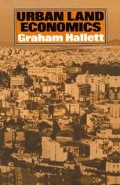Abstract
The economic philosophy which was dominant in the English-speaking intellectual world from the 1930s to the 1960s lauded the virtues of central direction and control, and decried market forces and local initiatives. This was even more marked in the discussion of urban policy than in other branches of economics. These ideas were widely implemen ted in Great Britain whereas in other countries they encountered more vigorous opposition; namely in the USA from a sturdy belief in free enterprise and local autonomy and in West Germany from a sophisti cated philosophy of a ‘socially responsible market economy’. Many writers, both in Britain and abroad, argued that what was being implemented in Britain — the sweeping powers of development control, the 1947 development charge’ and later the Land Commission, ‘slum clearance’ and New Towns, rent control and council housing — was a model for the world. But an increasing number of people began to feel that the Emperor’s clothes did not warrant such adulation. ‘Planning’ was frequently oppressive in detail and unimpressive in its total results; the various development taxes did not work well in practice; ‘slum clearance’ brutally destroyed neighbourhoods; council housing had its defects.
Market economy, price mechanism and competition are fine, but they are not enough.... Market economy is one thing in a society where atomisation, proletarianization, and concentration rule; it is quite another in a society approaching anything like the ‘natural order’ .. . In such a society wealth would be widely dispensed; people’s lives would have solid foundations; genuine communities, from the family upward, would form a background of moral support for the individual; there would be counterweights to competition and the mechanical operation of prices; people would have roots and would not be adrift to life without anchor; there would be a broad belt of an independent middle class, a healthy balance between town and country, industry and agriculture. The decision on the ultimate destiny of the market economy, with its admirable mechanism of supply and demand, lies, in other words, beyond supply and demand.
Wilhelm Röpke, A Humane Economy trans. Elizabeth Henderson
1960, Chicago, U.S.A.
Access this chapter
Tax calculation will be finalised at checkout
Purchases are for personal use only
Preview
Unable to display preview. Download preview PDF.
References: Concluding Thoughts
Capitalism and the Permissive Society Macmillan, 1963, p. 122.
Herman Kahn, On Thermonuclear War. Princeton University Press, 1960.
Edward C. Banfield, The Unheavenly City, Boston, 1970.
E. S. Schumacher, Small is Beautiful, Blond and Briggs, London, 1973.
K. E. Boulding, Economics as a Science, New York, 1970, p. 146.
Herman Kahn. The Next 200 Years. Morrow, 1976.
Paul Johnson, Enemies of Society Wiedenfeld and Nicholson, 1977.
Kevin Lynch, The Image of the City, MIT Press, 1960. Ibid— “The Possible City” in L. S. Bourne (ed.), Internal Structure of the City.
Alan A. Enthoven, ‘Economic Analysis in the Dept. of Defence’, American Economic Review, May 1963.
Author information
Authors and Affiliations
Copyright information
© 1979 Graham Hallett
About this chapter
Cite this chapter
Hallett, G. (1979). Concluding Thoughts. In: Urban Land Economics. Palgrave Macmillan, London. https://doi.org/10.1007/978-1-349-04537-2_13
Download citation
DOI: https://doi.org/10.1007/978-1-349-04537-2_13
Publisher Name: Palgrave Macmillan, London
Print ISBN: 978-1-349-04539-6
Online ISBN: 978-1-349-04537-2
eBook Packages: Palgrave Economics & Finance CollectionEconomics and Finance (R0)

